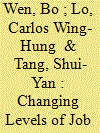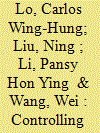|
|
|
Sort Order |
|
|
|
Items / Page
|
|
|
|
|
|
|
| Srl | Item |
| 1 |
ID:
173460


|
|
|
|
|
| Summary/Abstract |
As a result of multiple waves of administrative reforms in the past three decades, China's civil service has become more professionalized. Yet public employees appear to have become increasingly dissatisfied in recent years. Based on questionnaire surveys and interviews with environmental enforcement officials in a southern city, this paper traces changes in the job satisfaction levels of these officials between 2000 and 2014. It shows that satisfaction with the extrinsic rewards received and overall job satisfaction declined during this period. These downward trends partly reflected the increasingly challenging institutional environments faced by the officials: rising political and societal demands, inadequate fiscal and personnel resources, and limited enforcement authority. In addition, as the officials became more highly educated and professionalized, mission match became a stronger antecedent of job satisfaction. These findings suggest the importance of meeting the motivational needs of a more professionalized workforce.
|
|
|
|
|
|
|
|
|
|
|
|
|
|
|
|
| 2 |
ID:
146892


|
|
|
|
|
| Summary/Abstract |
This article traces the institutional development of environmental regulation in urban China, using data from three rounds of surveys of enforcement officials in the Guangzhou Environmental Protection Bureau in 2000, 2006 and 2013. We found that the changes to institutional contexts of regulatory control appear mainly in the fluctuating degree of support from various non-state actors, but not from government entities and regulated industries. While we detected visible organizational changes in local environmental enforcement bureaus, there was also organizational stability. First, the quality of enforcement officials has improved, as reflected by a higher level of education, first from 2000–2006 and then from 2006–2013. Second, the perceived value of enforcement officials in environmental protection was considerably enhanced in the period 2000–2006, and then remained stable from 2006 to 2013. Third, enforcement obstacles in terms of administrative ambiguity remained virtually unchanged from 2000 to 2013, while enforcement power deficit, resource scarcity and procedural ambiguity became more severe. Overall, the general perception of enforcement effectiveness at both the unit and organizational levels has remained the same over the past 13 years, whereas individual-level enforcement was perceived to have become more effective (with significant changes mainly taking place from 2006 to 2013). On the basis of these empirical results, we found that the institutional conditions for stricter enforcement in Guangzhou were visibly improved from 2000 to 2006, but only modestly improved between 2006 and 2013.
|
|
|
|
|
|
|
|
|
|
|
|
|
|
|
|
| 3 |
ID:
095825


|
|
|
|
|
| Publication |
2010.
|
| Summary/Abstract |
The surge in automobile use in the Pearl River Delta region has led to a substantial elevation of ambient concentrations of vehicle-based air pollutants. These pollutants have created a region-wide air pollution problem marked by a steady increase in the number of smoggy days in the Delta, presenting a serious threat to public health. Evidence gathered from Guangzhou suggests that the city's strategy for controlling urban air pollution has not been effective in tackling the newly emerging, combustion engine-generated class of pollutants because it is misguided by a highly selective and outdated urban air quality monitoring system. The disarticulation between vehicular emissions and urban emission control measures shows that a central government-prescribed methodology for air quality monitoring can strongly influence the policy priorities and administrative behavior of local government institutions.
|
|
|
|
|
|
|
|
|
|
|
|
|
|
|
|
|
|
|
|
|